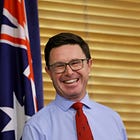Opposition Criticizes Social Media Ban Guidelines, Warns of Digital ID Requirements
Today’s email is brought to you by Empower your podcasting vision with a suite of creative solutions at your fingertips.

Shadow Communications Minister Melissa McIntosh criticized the federal government's newly released social media ban guidelines Tuesday, warning that insufficient safeguards could force adults to provide digital identification and expressing concern the policy lacks adequate enforcement mechanisms.
Speaking on ABC's Afternoon Briefing, McIntosh said the guidelines show the Albanese government "stepping back a bit on the requirements" for social media companies to identify children under 16, raising questions about the policy's effectiveness when it takes effect December 10.
"What's being said today in this announcement shows that there is concern," McIntosh said. "The government is stepping back a bit on the requirements for these social media companies to identify children under 16."
The Opposition's criticism came as the government defended its regulatory guidance for implementing Australia's world-first social media age ban, which requires platforms to prevent users under 16 from accessing their services or face fines up to 50 million Australian dollars.
Truth matters. Quality journalism costs.
Your subscription to Mencari directly funds the investigative reporting our democracy needs. For less than a coffee per week, you enable our journalists to uncover stories that powerful interests would rather keep hidden. There is no corporate influence involved. No compromises. Just honest journalism when we need it most.
Not ready to be paid subscribe, but appreciate the newsletter ? Grab us a beer or snag the exclusive ad spot at the top of next week's newsletter.
Digital ID Concerns Raised
McIntosh expressed particular concern about provisions allowing the eSafety Commissioner to require digital identification verification if other age assurance measures prove inadequate, despite government assurances that multiple verification options would remain available.
"I'm concerned that it will get to a stage where digital ID may need to be used," she said. "The eSafety Commissioner does have the power to have digital ID as a requirement if other measures fall through."
The guidelines released Tuesday specify that platforms must offer users a choice between various age verification methods, including facial recognition technology, document verification, behavioral analysis and monitoring of language patterns and emoji usage.
McIntosh argued that despite these multiple options, the potential for digital ID requirements remains problematic for adult users' privacy rights.
"There is a power there that it could be an option if required," she said. "It doesn't matter whether she says she won't use it, she does have that power that digital ID may be an option."
Implementation Concerns Mount
The Opposition spokesperson questioned whether the government has adequately prepared for the December 10 implementation date, citing concerns from families affected by social media harm about public awareness of the coming changes.
"Something that those families raised with me was that they didn't have confidence that families were educated this is coming," McIntosh said. "It's happening over the Christmas holidays when children may usually be attached to their phones. Schools aren't aware."
McIntosh said bereaved parents who have lost children to social media-related harm and now advocate for online safety measures have expressed frustration that schools and families remain largely unaware of the impending ban.
"Some of these parents go around to schools now they've lost their children to try and ensure that no other child is lost and they're just aghast that people are just not aware this is coming," she said.
The guidelines do not specify minimum accuracy levels that technology companies must meet in their age verification systems, which McIntosh characterized as potentially providing too much flexibility for platforms to avoid compliance.
"It seems like the government seems to be stepping back a little bit around what that reasonable measure is," she said. "What's going to happen on the 10th of December? Are they going to allow some time for take-up?"
Policy Intent Remains Support
Despite her criticisms of the implementation approach, McIntosh reaffirmed the Opposition's support for protecting children online, noting the policy originated from Coalition commitments made before the election.
"We have to remember the intent of this," she said. "At the very start when we announced the policy before the election was to protect our children. And I made a commitment to families who came to Canberra that we would do everything we could."
She described meeting with families who had lost children to social media harm, saying these parents lacked confidence that the government would be prepared for the ban's implementation.
"These families had lost their children to social media harm and they weren't convinced when they met with the Prime Minister and the Communications Minister that the government would be ready for this ban to come into place," McIntosh said.
The Shadow Minister acknowledged the challenge of balancing child protection with adult privacy concerns, warning that public frustration with verification requirements could undermine the policy's child safety objectives.
"I don't want adults to get so fed up with potentially having to have digital ID as an option that the intent of protecting our kids just gets lost," she said. "We need to have these two separate conversations."
Data Sovereignty Issues Highlighted
McIntosh used the interview to raise broader concerns about digital sovereignty, arguing that most Australian data is stored on foreign servers without adequate protection or public awareness.
"Our data is being stored in foreign servers," she said. "People in Australia wouldn't even know. I spoke to older people in a retirement village yesterday and asked if they knew where their data was stored. No one knows."
She called for stronger requirements to store Australian data domestically, linking the issue to national communications sovereignty and security concerns.
"I want our data to be here in data centres in this country," McIntosh said. "So Australians have a right to know where their data is being stored, how it's protected, and that if there's an issue that arises, it may be their data, but it might be under foreign control."
The data sovereignty concerns extend beyond the social media ban to encompass broader digital infrastructure issues, including foreign satellite systems and offshore data storage facilities handling Australian information.
"There's a huge sovereign piece from the foreign satellites in our skies to the foreign data centres that are storing our information that we should be really addressing as a country right now looking at the future," she said.
Government's Reasonable Steps Approach
The guidelines require social media companies to take "reasonable steps" to prevent under-16 users from accessing their platforms, but do not mandate universal age verification for all users. Companies can use existing behavioral data, artificial intelligence tools and other inference methods to identify likely underage users.
When pressed about whether the flexible "reasonable steps" requirement adequately addresses her concerns about adult privacy, McIntosh maintained that the potential for digital ID requirements remains problematic.
"They can get to the stage where they could request digital identification," she said. "It says they have to provide a choice, but what's stopping them getting to that end stage? And where does our data go, so if we do get to digital ID?"
The guidelines specifically state that platforms cannot use government identification as the sole verification method and must always provide alternative options for users who prefer not to provide official documents.
eSafety Commissioner Julie Inman Grant has pointed to recent implementations by companies including Roblox and Reddit as evidence that effective age verification systems can be deployed without requiring universal digital ID verification.
Climate Policy Discussion
The interview also covered the Liberal Party's ongoing review of its climate and energy policies, with McIntosh defending shadow minister Andrew Hastie's public opposition to the net zero by 2050 target.
"It's great that we are in a democracy and people are able to exercise their views," she said. "And Andrew is absolutely right to be able to do that because we haven't settled on a policy yet."
McIntosh said she is consulting with her Western Sydney constituents about climate policies, emphasizing cost of living concerns over environmental targets.
"We are struggling so much right now under high power prices," she said. "Cost of living is the top issue that people are facing right now. And that $275 promise, people are paying 30% more and this is in Western Sydney."
When asked whether the Opposition should focus on 2035 emission targets rather than debating net zero, McIntosh questioned the effectiveness of Australia's climate policies given the country's relatively small contribution to global emissions.
"If you could tell me how the Albanese Labor government's policies around net zero are going to save those 1.5 million homes when we have only 1% of emissions, then I think that's the biggest question," she said, referring to a recent climate risk assessment.
Accountability Framework
McIntosh framed her criticism of the social media ban guidelines within the Opposition's role of holding the government accountable for its promises to Australian families.
"I do hope, we do hope it works out because we do want to protect Australian children," she said. "I'm doing my job in holding the government to account in ensuring that it meets its promises that it is made to every family across this country."
She emphasized that despite technical concerns about implementation, the ultimate goal remains protecting children from online harm.
"We want kids to be protected online," McIntosh said. "It's abhorrent what they've got access to and, you know, inappropriate content, bullying."
The social media age ban represents one of the most significant regulatory interventions in digital platform operations globally, with other jurisdictions closely watching Australia's implementation approach.
The December 10 deadline leaves technology companies less than three months to develop and deploy age verification systems that meet the government's requirements while addressing privacy concerns raised by the Opposition and digital rights advocates.
McIntosh's comments reflect broader tensions between child safety objectives and digital privacy rights that have characterized debate over the legislation since its introduction, with implementation details continuing to evolve as the deadline approaches.
The success or failure of Australia's social media age ban could influence similar legislative efforts in other countries, making the technical and policy challenges highlighted by the Opposition particularly significant for global digital governance frameworks.
Sustaining Mencari Requires Your Support
Independent journalism costs money. Help us continue delivering in-depth investigations and unfiltered commentary on the world's real stories. Your financial contribution enables thorough investigative work and thoughtful analysis, all supported by a dedicated community committed to accuracy and transparency.
Subscribe today to unlock our full archive of investigative reporting and fearless analysis. Subscribing to independent media outlets represents more than just information consumption—it embodies a commitment to factual reporting.
As well as knowing you’re keeping Mencari (Australia) alive, you’ll also get:
Get breaking news AS IT HAPPENS - Gain instant access to our real-time coverage and analysis when major stories break, keeping you ahead of the curve
Unlock our COMPLETE content library - Enjoy unlimited access to every newsletter, podcast episode, and exclusive archive—all seamlessly available in your favorite podcast apps.
Join the conversation that matters - Be part of our vibrant community with full commenting privileges on all content, directly supporting The Evening Post (Australia)
Catch up on some of Mencari’s recent stories:
It only takes a minute to help us investigate fearlessly and expose lies and wrongdoing to hold power accountable. Thanks!






